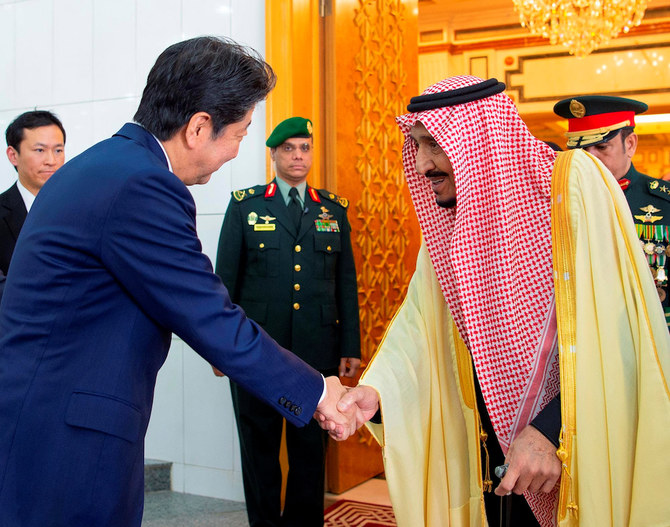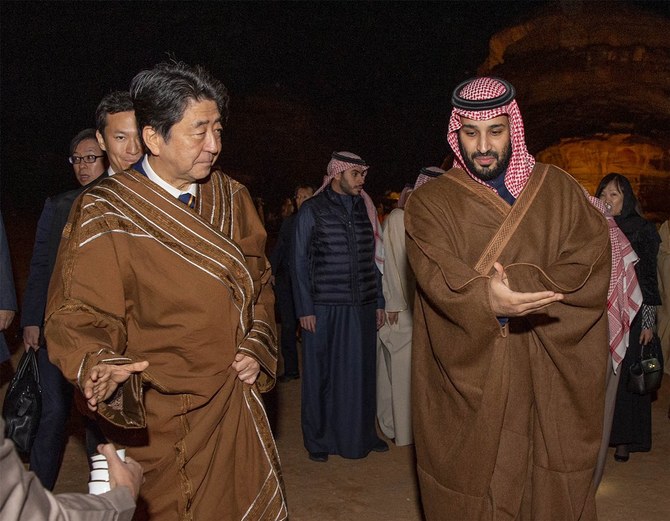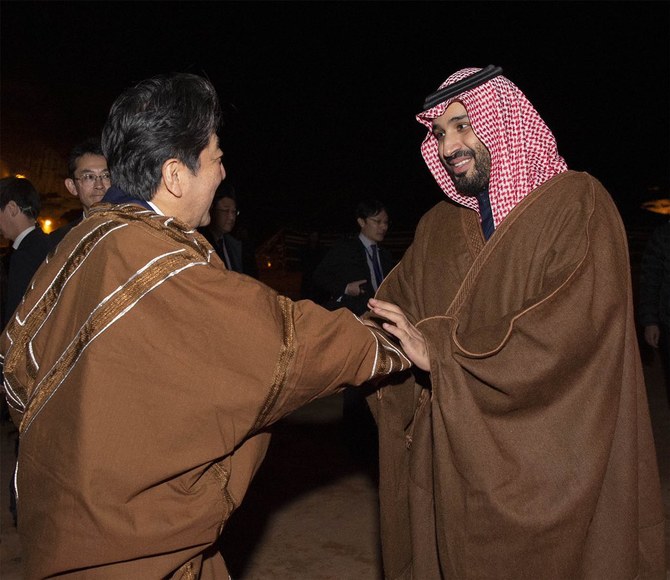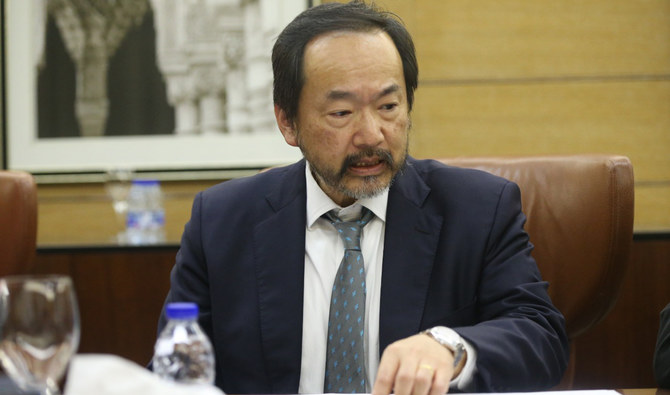RIYADH: Japanese Prime Minister Abe Shinzo on Sunday met Saudi Arabia’s king and crown prince to discuss the regional situation, during the first leg of his Middle East tour.
The premier was received by King Salman in Riyadh for talks aimed at helping smooth relations between the US and Iran.
He later met with Crown Prince Mohammed bin Salman in AlUla, where they discussed regional developments, with Abe praising the Kingdom’s conduct during the recent heightening of tensions in the region.
“The meeting was full of substance,” said Masato Ohtaka, Japan’s foreign ministry director general for press and public diplomacy. “They exchanged views on the current situation and what needs to be done to defuse the tension.”
During the meeting the prime minister told the crown prince that further escalation of the situation had to be avoided, and Ohtaka added: “He (Abe) appreciates the fact that relevant countries such as Saudi Arabia are showing restraint.
“Abe mentioned that any military confrontation that might take place in the Middle East including Iran, will have profound impact on the peace and stability of not only the region but also the world.”
On Japan’s mediation role with Iran, Ohtaka said: “This subject on Iran is extremely delicate. I hesitate to go into too much detail on this. We don’t necessarily characterize our efforts as mediation.” He noted that Japan was the only country in Asia that had been engaging on this issue.
The spokesman also highlighted how Japan could play a role, given its close relationship with the US and established ties with Iran.
“Japan is an ally of the US, and also has a long-standing relationship with Iran, and based on those relationships has been engaged in playing a role in those contexts,” Ohtaka added.
Abe and the crown prince also discussed other bilateral issues, as the Japanese leader was received with traditional Saudi hospitality inside a Bedouin tent. Their meeting, which lasted about an hour, included a 20-minute private discussion.
The Japanese PM said he highly appreciated the reform efforts taking place within the Kingdom which were not only important for Saudi Arabia but the region and ultimately the world too.
Abe promised that Japan would fully support Crown Prince Mohammed’s reform efforts through the Saudi-Japan Vision 2030, a cooperation framework that has been around since 2016. The two nations are working on a broad range of areas and have already concluded four ministerial-level meetings and identified 69 areas of cooperation.
During their talks in Riyadh, Abe and King Salman confirmed their cooperation toward the successes of the G20 meetings to be hosted by Saudi Arabia this year and the Tokyo Olympics and Paralympics. In their 40-minute discussions, the king expressed expectations that his country and Japan would deepen their strategic partnership in various fields, not only in the energy sector.
The day’s session was the fifth meeting between the two leaders since the start of Abe’s current administration in December 2012. At that time, King Salman was crown prince.
In his discussion with Crown Prince Mohammed, Abe said that Japan would support Saudi Arabia in its hosting of the next G20 summit in Riyadh. The crown prince in turn pledged that the Kingdom would follow up on the outcomes of the last G20 meeting in Osaka.
As the Japanese leader arrived in AlUla, his delegation was received by Prince Badr bin Abdullah bin Farhan Al-Saud, the Saudi culture minister and governor of the Royal Commission for AlUla.
AlUla, the last stop in Abe’s visit to the Kingdom before he continues his journey to the UAE and Oman, is full of archaeological treasures nestling amid stunning desert landscapes.
Saudi Arabia’s move to open up Hegra city and the AlUla Valley is restoring a missing chapter in the history of the Arabian Peninsula and the world. Bearing the name Mada’in Salih in the post-Islamic era, the lost city of Hegra was built by the Nabataeans, like its famous twin Petra in Jordan. They controlled the profitable trade routes that crossed the Arabian Peninsula from east to west and north to south from about the fourth century B.C. to A.D. 106.
Abe’s tour of AlUla will cast a spotlight on the ancient site as it prepares to open its doors to the public later this year.



















